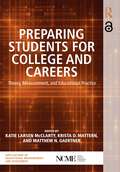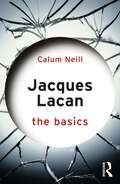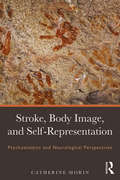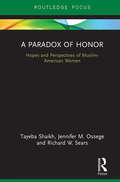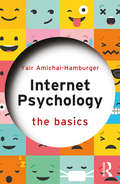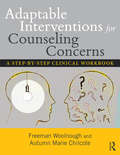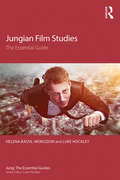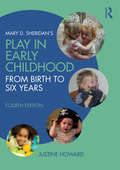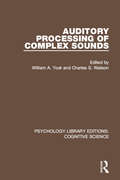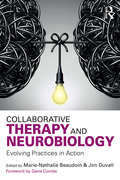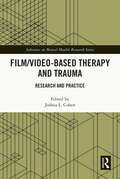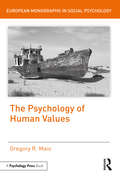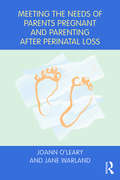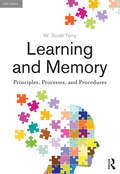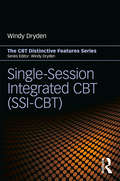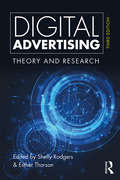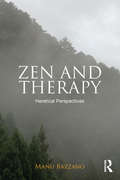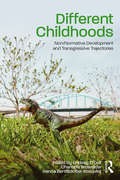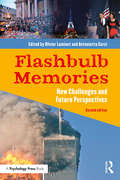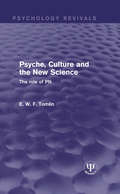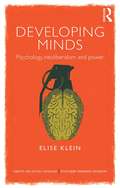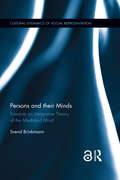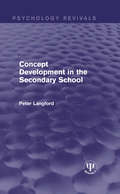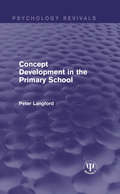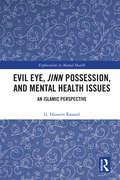- Table View
- List View
Preparing Students for College and Careers: Theory, Measurement, and Educational Practice
by Katie Larsen McClarty Krista D. Mattern Matthew N. GaertnerPreparing Students for College and Careers addresses measurement and research issues related to college and career readiness. Educational reform efforts across the United States have increasingly taken aim at measuring and improving postsecondary readiness. These initiatives include developing new content standards, redesigning assessments and performance levels, legislating new developmental education policy for colleges and universities, and highlighting gaps between graduates’ skills and employers’ needs. In this comprehensive book, scholarship from leading experts on each of these topics is collected for assessment professionals and for education researchers interested in this new area of focus. Cross-disciplinary chapters cover the current state of research, best practices, leading interventions, and a variety of measurement concepts, including construct definitions, assessments, performance levels, score interpretations, and test uses.
Jacques Lacan: The Basics (The Basics)
by Calum NeillJacques Lacan: The Basics provides a clear and succinct introduction to the work of Jacques Lacan, one of the key thinkers of the twentieth century. Lacan’s ideas are applied in the study of the humanities, politics, and psychology as well as contemporary media and the arts, but their complexity makes them impenetrable to many. This book is unique in explaining the key concepts and context, from Lacan’s understanding of psychoanalysis to drive and desire, in an accessible way without diluting them beyond meaning. Examples from popular culture are used throughout to emphasise the ideas being discussed and a full glossary and list of resources for further reading encourages additional exploration. This engaging and accessible text is essential reading for all those interested in Lacan and his work, as well as students of psychology, psychoanalysis, literature, politics, cultural studies, film studies, and more.
Stroke, Body Image, and Self Representation: Psychoanalytic and Neurological Perspectives
by Catherine MorinStroke, Body Image, and Self Representation provides a psychoanalytic reading of the subjective difficulties encountered by patients who have suffered a stroke. The book is based on the words of stroke patients and on their self-portraits, which are then compared with the words and portraits of subjects devoid of brain lesions. Pathological and normal self-portraits illustrate in very concrete terms the libidinal investment of our body parts. The author's original data sheds an entirely new light on the subjective effects of a stroke. On the one hand, the permanent sequelae of a stroke can cause a narcissistic injury; on the other, a stroke may affect the brain circuitry involved in the patient's body image, undoing the normal narcissistic reactions. This may happen after right hemisphere lesions and cause spectacular symptoms, such as the personification of a paralyzed hand or the apparent ignorance of a severe paralysis. This double aspect of a stroke is no small problem for rehabilitation therapists, who must avoid two pitfalls: considering any issue as psychological in nature, as if the brain lesion could not produce any organic changes, or, on the contrary, attributing any behavioural problems to brain dysfunction, as if the patient was devoid of normal psychological reactions. One of the aims of this book is to help therapists gaining their bearings in this little-known field. In addition to this clinical interest, the author's psychoanalytic reading brings an original contribution to the physiopathology of cognition and self-representation. The data gathered by Catherine Morin show that self-representation cannot be considered only a cognitive operation. They also suggest that normal cognitive activity relies on both the stability of body image and the repression of the object. Stroke, Body Image, and Self Representation will appeal to psychoanalysts, psychologists, social workers, psychotherapists, psychiatrists, and rehabilitation therapists working with stroke survivors and patients with body image disorders.
A Paradox of Honor: Hopes and Perspectives of Muslim-American Women (Researching Social Psychology)
by Tayeba Shaikh Jennifer M. Ossege Richard W. SearsBased on original interviews of 22 Muslim-American women of South Asian descent on the topics of honor and honor killings, this book examines honor and culture, and their intersections with power, tradition, gender, family, and religion. Additionally, it incorporates an autoethnographic approach describing the author’s journey to Pakistan to create a personal narrative throughout. This volume offers a unique perspective that allows for informed exploration and description of Muslim-American women’s attitudes and beliefs surrounding the practice of killing women and girls in order to regain family honor.
Internet Psychology: The Basics
by Yair Amichai-HamburgerWe can't imagine our lives without the Internet. It is the tool of our existence; without it we couldn't work, plan our social and leisure activities, and interact with friends. The Internet’s influence on contemporary society extends across every aspect of our personal and professional lives, but how has this altered us in psychological terms? How are we to understand how the Internet can promote enormous amounts of caring and kindness to strangers and yet be the source of unremitting acts of terror? This book, grounded in the latest cutting-edge research, enhances our understanding of how we, and our children, behave online. It explores questions such as: Why does our self-control abandon us sometimes on the Internet? Why does the Internet create a separate realm of social and personal relationships? How does all that change us as people? Are youngsters really as exposed and threatened on the web as people think? Internet Psychology: The Basics is a vital and fascinating guide to the online world, drawing on classic theories of human behaviour to shed fresh light on this central facet of modern life. It argues that, even in an age of constant technological advancement, our understanding of the human psyche remains rooted in these well-established theories. Embracing both positive and negative aspects of Internet use, this easy introduction to the subject will appeal to students and general readers alike.
Adaptable Interventions for Counseling Concerns: A Step-by-Step Clinical Workbook
by Freeman Woolnough Autumn Marie ChilcoteAdaptable Interventions for Counseling Concerns is filled with more than 40 interventions appropriate for new and experienced professionals alike. The interventions are organized in a unique yet practical manner, including options for individual reader creativity and personal adaptations within the text itself. The book’s uniqueness lies in the broad coverage of common concerns, formatting, and ease in navigation. Each chapter is devoted to a specific client concern, with seven suggested intervention strategies clearly labeled by modality to make it easy for readers to find new interventions best suited to their practice. Chapters also introduce relevant and recent research on client concerns, contextualizing the circumstances for which a counseling professional could apply the chosen interventions. Intervention sections also include space for individualized notes and reader personalization.
Jungian Film Studies: The essential guide (Jung: The Essential Guides)
by Helena Bassil-Morozow Luke HockleyJungian film studies is a fast-growing academic field, but Jungian and post-Jungian concepts are still new to many academics and film critics. Helena Bassil-Morozow and Luke Hockley present Jungian Film Studies: The Essential Guide, the first book to bring together all the different strands, issues and arguments in the discipline, and guide the reader through the various ways in which Jungian psychology can be applied to moving images. Bassil-Morozow and Hockley cover a range of Jungian concepts including the collective unconscious, archetypes, the individuation process, alchemy, and signs and symbols, showing how they can be used to discuss the core cinematic issues such as narrative structure, gender, identity, genre, authorship, and phenomenology. The authors argue that, as a place where the unconscious and conscious meet, cinema offers the potential for imagery that is psychologically potent, meaningful, and that plays a role in our personal psychological development. This much-needed book, which bridges the space between Jungian concepts and traditional film theory, will be essential reading for scholars and students of Analytical Psychology, psychoanalysis, Jungian film studies, media, film and cultural studies, psychosocial psychology and clinical psychology. It will also appeal to analytical psychologists, psychotherapists and readers with an interest in film analysis.
Mary D. Sheridan's Play in Early Childhood: From Birth to Six Years
by Justine HowardMary D. Sheridan’s Play in Early Childhood is a classic introductory text to play and development – key topics for all those who work with young children. Drawing on the most up-to-date evidence, it explains how children’s play develops and how they develop as they play. With over 100 illustrations and observations of play from birth to six years, this new edition presents classical and contemporary literature, making clear links between play and all areas of children’s development. It includes updated activities to consolidate thinking and suggestions for further reading throughout. This text considers: the development, value and characteristics of play issues relating to culture, adversity, gender, attachment and brain development play from recreational, therapeutic and educational perspectives the role of parents/caregivers and professionals in supporting play how to develop observation and reflection skills for use in your own practice Suitable both for those new to the area and for more experienced workers wanting a quick reference guide, this easy-to-follow book meets the needs of students and professionals from a wide range of health, education and social care backgrounds, including early years professionals, playworkers, children’s nurses, play therapists and social workers.
Auditory Processing of Complex Sounds (Psychology Library Editions: Cognitive Science)
by William A. Yost Charles S. WatsonOriginally published in 1987, this book is the result of a workshop on the processing of complex sounds held in 1986. All of the important contributions that are being made to understanding auditory processing of complex sounds could not be included in a single volume. However, the chapters do touch base with many of the lines of research and theory on complex sound and its perception at the time, and was felt that they should provide both food for thought and a broad introduction to the literature on a topic that the editors were sure would be studied intensely in the following couple of decades.
Collaborative Therapy and Neurobiology: Evolving Practices in Action
by Jim Duvall Marie-Nathalie BeaudoinCollaborative Therapy and Neurobiology is the book many clinicians have been waiting for: an integration of twenty years of scientific and therapeutic cutting-edge ideas into concrete clinical practices. Interpersonal neurobiology and the development of exciting new technologies that allow us to better understand the brain have provided us with an enriched perspective on human experience. Yet, many clinicians wonder how to use this knowledge, and how these discoveries can actually benefit their clients. In particular, what are the concrete practices that each field uses to help clients overcome the issues in their lives, and how can these fields build on each other’s ideas? Could minimally developed concepts in each field be combined into innovative and powerful practices to foster client wellbeing? This book offers a collection of writings which provide theoretical food for thought, research evidence, and most importantly hands-on, concrete clinical ideas to enrich therapists’ work with a variety of clients. Illustrated with numerous transcripts of conversations and clinical stories, the ideas in this book will stimulate the work of people interested in renewing their practice with new ideas.
Film/Video-Based Therapy and Trauma: Research and Practice (Advances in Mental Health Research)
by Joshua L. CohenThis book uses film/video-based therapy to help build resilience in facing personal, communal, national, and global trauma triggers. Offering a rich and diverse range of perspectives on trauma, this volume advocates positive social change using therapeutic techniques in filmmaking as well as film/video-based therapy, in conjunction with expressive art therapies such as drama, dance, music, painting, drawing, and more. Chapter authors address issues in one’s home, community, country, and the world using integrative medicine and advocacy using film/video-based therapy and digital storytelling. The book highlights psychological trauma and how one can cope with the overwhelming triggers in today’s world. It represents an articulate and comprehensive analysis of the ways in which traumatic human experience impacts, and is modified by, film and video media. Representing a rich and diverse range of perspectives on trauma through the lens of a camera, the authors document important examples of moments in which artistic expression becomes human resilience. Demonstrating how the language of film can facilitate watching, processing, and discussing images of trauma in therapy, in the home, in the community, and in the world, this volume will be of interest to educators and mental health practitioners with an interest in advancing psychotherapy and counseling techniques.
The Psychology of Human Values (European Monographs in Social Psychology)
by Gregory R MaioThis original and engaging book advocates an unabashedly empirical approach to understanding human values: abstract ideals that we consider important, such as freedom, equality, achievement, helpfulness, security, tradition, and peace. Our values are relevant to everything we do, helping us choose between careers, schools, romantic partners, places to live, things to buy, who to vote for, and much more. There is enormous public interest in the psychology of values and a growing recognition of the need for a deeper understanding of the ways in which values are embedded in our attitudes and behavior. How do they affect our well-being, our relationships with other people, our prosperity, and our environment? In his examination of these questions, Maio focuses on tests of theories about values, through observations of what people actually think and do. In the past five decades, psychological research has learned a lot about values, and this book describes what we have learned and why it is important. It provides the first overview of psychological research looking at how we mentally represent and use our values, and constitutes important reading for psychology students at all levels, as well as academics in psychology and related social and health sciences.
Meeting the Needs of Parents Pregnant and Parenting After Perinatal Loss
by Joann M O'Leary Jane WarlandDespite research which highlights parents’ increased anxiety and risk of attachment issues with the pregnancy that follows a perinatal loss, there is often little understanding that bereaved families may need different care in their subsequent pregnancies. This book explores the lived experience of pregnancy and parenting after a perinatal loss. Meeting the Needs of Parents Pregnant and Parenting After Perinatal Loss develops a helpful framework, which integrates continuing bonds and attachment theories, to support prenatal parenting at each stage of pregnancy. Giving insight into how a parent’s world view of a pregnancy may have changed following a loss, readers are provided with tools to assist parents on their journey. The book discusses each stage of a pregnancy, as well as labor and the postpartum period, before examining subjects such as multi-fetal pregnancies, reluctant terminations, use of support groups, and the experiences of fathers and other children in the family. The chapters include up-to-date research findings, vignettes from parents reflecting on their own experiences and recommendations for practice. Written for researchers, students and professionals from a range of health, social welfare and early years education backgrounds, this text outlines what we know about supporting bereaved families encountering the challenges of a subsequent pregnancy.
Learning and Memory: Basic Principles, Processes, and Procedures (Fifth Edition)
by W. Scott Terry<p>This thoroughly updated edition provides a balanced review of the core methods and the latest research on animal learning and human memory. The relevance of basic principles is highlighted throughout via everyday examples to ignite student interest, along with more traditional examples from human and animal laboratory studies. Individual differences in age, gender, learning style, cultural background, or special abilities (such as the math gifted) are highlighted within each chapter to help students see how the principles may be generalized to other subject populations. <p>The basic processes of learning – such as classical and instrumental conditioning and encoding and storage in long-term memory in addition to implicit memory, spatial learning, and remembering in the world outside the laboratory – are reviewed. The general rules of learning are described along with the exceptions, limitations, and best applications of these rules. The relationship between the fields of neuropsychology and learning and memory is stressed throughout. <p>The relevance of this research to other disciplines is reflected in the tone of the writing and is demonstrated through a variety of examples from education, neuropsychology, rehabilitation, psychiatry, nursing and medicine, I/O and consumer psychology, and animal behavior. <p>Each chapter begins with an outline and concludes with a detailed summary. A website for instructors and students accompanies the book. Updated throughout with new research findings and examples the new edition features: <p> <li>A streamlined presentation for today’s busy students. As in the past, the author supports each concept with a research example and real-life application, but the duplicate example or application now appears on the website so instructors can use the additional material to illustrate the concepts in class. <li>Expanded coverage of neuroscience that reflects the current research of the field including aversive conditioning (Ch. 5) and animal working memory (Ch. 8). <li>More examples of research on student learning that use the same variables discussed in the chapter, but applies them in a classroom or student’s study environment. This includes research that applies encoding techniques to student learning, for example: studying: recommendations from experts (Ch. 1); the benefits of testing (Ch. 9); and Joshua Foer’s Moonwalking with Einstein, on his quest to become a memory expert (Ch. 6). <li>More coverage of unconscious learning and knowledge (Ch. 11). <li>Increased coverage of reinforcement and addiction (Ch. 4), causal and language learning (Ch. 6), working memory (WM) and the effects of training on WM, and the comparative evolution of WM in different species (Ch. 8), and genetics and learning (Ch. 12).</li>
Single-Session Integrated CBT: Distinctive features (CBT Distinctive Features)
by Windy DrydenUntil quite recently, therapist training was predicated on the notion that therapy is an ongoing process. Single-Session Integrated CBT (SSI-CBT) questions this. In this book, Windy Dryden takes long standing research on SSI therapy and transfers it to the field of CBT in a timely and conceptual application. Based on his extensive work demonstrating the benefits of single-session CBT to public and professional audiences, Dryden has developed a single-session approach for work in the therapy and coaching fields. Comprising 30 key points, and divided into two parts - Theory and Practice - this concise book covers the key features of SSI-CBT. It will offer essential guidance for students and practitioners experienced in CBT, as well as practitioners from other theoretical orientations who require an accessible guide to the distinctive theoretical and practical features of this exciting new approach.
Digital Advertising: Theory and Research (Advances in Consumer Psychology)
by Esther Thorson Shelly RodgersDigital Advertising offers a detailed and current overview of the field that draws on current research and practice by introducing key concepts, models, theories, evaluation practices, conflicts, and issues. With a balance of theory and practice, this book helps provide the tools to evaluate and understand the effects of digital advertising and promotions campaigns. New to this edition is discussion of big data analysis, privacy issues, and social media, as well as thought pieces by leading industry practitioners. This book is ideal for graduate and upper-level undergraduate students, as well as academics and practitioners.
Zen and Therapy: Heretical Perspectives
by Manu BazzanoZen and Therapy brings together aspects of the Buddhist tradition, contemporary western therapy and western philosophy. By combining insightful anecdotes from the Zen tradition with clinical studies, discussions of current psychotherapy theory and forays into art, film, literature and philosophy, Manu Bazzano integrates Zen Buddhist practice with psychotherapy and psychology. This book successfully expands the existing dialogue on the integration of Buddhism, psychology and philosophy, highlighting areas that have been neglected and bypassed. It explores a third way between the two dominant modalities, the religious and the secular, a positively ambivalent stance rooted in embodied practice, and the cultivation of compassion and active perplexity. It presents a life-affirming view: the wonder, beauty and complexity of being human. Intended for both experienced practitioners and beginners in the fields of psychotherapy and philosophy, Zen and Therapy provides an enlightening and engaging exploration of a previously underexplored area.
Different Childhoods: Non/Normative Development and Transgressive Trajectories
by Lindsay O'Dell Charlotte Brownlow Hanna Bertilsdotter-RosqvistDifferent Childhoods: Non/Normative Development and Transgressive Trajectories opens up new avenues for exploring children’s development as contextual, provisional and locally produced, rather than a unitary, universal and consistent process. This edited collection frames a critical exploration of the trajectory against which children are seen to be ‘different’ within three key themes: deconstructing ‘developmental tasks’, locating development and the limits of childhood. Examining the particular kinds of ‘transgressive’ development, contributors discuss instances of ‘difference’ including migration, work, assumptions of vulnerability, trans childhoods, friendships and involvement in crime. Including both empirical and theoretical discussions, the book builds on existing debates as part of the interrogation of ‘different childhoods’. This book provides essential reading for students wishing to explore notions of development while also being of interest to both academics and practitioners working across a broad area of disciplines such as developmental psychology, sociology, childhood studies and critical criminology.
Flashbulb Memories: New Challenges and Future Perspectives
by Olivier Luminet Antonietta CurciAre Flashbulb memories special or ordinary memory formations? Are emotional, cognitive, or social factors highly relevant for the formation of Flashbulb memories? How can sociological, historical, and cultural issues help us to understand the process? What is the difference between Flashbulb memories, memories of traumatic experiences, and highly vivid personal memories? How can we provide a valid and reliable measure for Flashbulb memories? This edition of Flashbulb Memories: New Challenges and Future Perspectives revisits these questions, considering significant new evidence and research in the field. It now includes additional chapters focusing on experimental investigations, and review studies on positive vs. negative Flashbulb memories. Bringing together leading international researchers, the book presents significant progress in this area of research, which has remained divisive for the past 40 years. The discussion of Flashbulb memories also contributes to the understanding of the general functioning of autobiographical memory. It will provide essential reading for researchers in Flashbulb memories and will be of great interest to those in related areas such as cognitive psychology, social psychology, cross-cultural psychology, sociology, political sciences, and history, as well as clinicians dealing with those who have strong Flashbulb memories after personal traumatic events.
Psyche, Culture and the New Science: The Role of PN (Psychology Revivals)
by E. W. TomlinOriginally published in 1985, this distinguished and constructive critique of modern culture introduced into our language a brand-new term, ‘PN’, standing for ‘psychic nutrition’, which at the time promised to become a household expression. Drawing on his first-hand knowledge of oriental civilizations; on discoveries of Jung, especially his concept of psychic energy; on the ideas of the cultural anthropologists; and not least on the New Science implicit in microphysics and microbiology, E.W.F. Tomlin, whose philosophical books have been translated into several languages, shows how the human psyche requires its own kind of nourishment just as urgently as the body needs food. In the industrial societies of the West, this need has often been ignored. Reformers, in their earnest though sometimes inept endeavours to create a better world, have too often exposed us to the dangers of psychic starvation and the noxious effects of what may be called ‘neg-PN’. Here lie the roots of violence and the lack of direction so conspicuously afflicting modern man and woman. Examples of PN, positive and negative, are given, lending the book an immediacy and practical character often lacking in studies of this kind. In the new scientific approach here adopted, the divisions between matter and life, and life and mind, are discarded, and the old conflict between science and religion shown to belong to an out-of-date world view. The result is a radical reappraisal of the nature and function of religion and art, the two great psychic forces in history. Indeed, the present crisis is shown to originate in the psychic sphere rather than in the political and economic order. Deeply felt and elegantly written, yet not lacking in wit and humour, the book ends with some concrete ideas on how a more balanced culture may be achieved.
Developing Minds: Psychology, neoliberalism and power (Concepts for Critical Psychology)
by Elise KleinDevelopment policy makers and practitioners are becoming increasingly sophisticated in their ability to target ‘development’ interventions and the psychological domain is now a specific frontier of their interventional focus. This landmark study considers the problematic relationship between development and psychology, tracing the deployment of psychological knowledge in the production/reproduction of power relations within the context of neoliberal development policy and intervention. It examines knowledge production and implementation by actors of development policy such as the World Bank and the neo-colonial state - and ends by examining the proposition of a critical psychology for more emancipatory forms of development. The role of psychology in development studies remains a relatively unexplored area, with limited scholarship available. This important book aims to fill that gap by using critical psychology perspectives to explore the focus of the psychological domain of agency in development interventions. It will be essential reading for students, researchers, and policy makers from fields including critical psychology, social psychology, development studies and anthropology.
Persons and their Minds: Towards an Integrative Theory of the Mediated Mind (Cultural Dynamics of Social Representation)
by Svend BrinkmannToday’s approaches to the study of the human mind are divided into seemingly opposed camps. On one side we find the neurosciences, with their more or less reductionist research programs, and on the other side we find the cultural and discursive approaches, with their frequent neglect of the material sides of human life. Persons and their Minds seeks to develop an integrative theory of the mind with room for both brain and culture. Brinkmann’s remarkable and thought-provoking work is one of the first books to integrate brain research with phenomenology, social practice studies and actor-network theory, all of which are held together by the concept of the person. Brinkmann’s new and informative approach to the person, the mind and mental disorder give this book a wide scope. The author uses Rom Harré’s hybrid psychology as a meta-theoretical starting point and expands this significantly by including four sources of mediators: the brain, the body, social practices and technological artefacts. The author draws on findings from cultural psychology and argues that the mind is normative in the sense that mental processes do not simply happen, but can be done more or less well, and thus are subject to normative appraisal. In addition to informative theoretical discussions, this book includes a number of detailed case studies, including a study of ADHD from the integrated perspective. Consequently, the book will be of great interest to academics and researchers in the fields of psychology, philosophy, sociology and psychiatry.
Concept Development in the Secondary School (Psychology Revivals)
by Peter LangfordOriginally published in 1987, this book introduces the reader to work on the intellectual development of adolescents relevant to the secondary school teacher. It covers the teaching of English, history, geography, economics, politics, legal studies, physics, chemistry, biology and mathematics. Although it emphasises the continuing importance of Piaget’s thought, the book aims to introduce readers to the non-Piagetian research that had taken place in recent years.
Concept Development in the Primary School (Psychology Revivals)
by Peter LangfordOriginally published in 1987, this book introduces work on the intellectual development of children in the primary school. It contains chapters on the teaching of reading, writing, art, science and mathematics. While critical of many of the once popular ideas of Jean Piaget, the author also emphasises the continuing validity of some aspects of Piaget’s thinking.
Evil Eye, Jinn Possession, and Mental Health Issues: An Islamic Perspective (Explorations in Mental Health)
by G. Hussein RassoolEvil Eye, Jinn Possession, and Mental Health Issues raises awareness of the cultural considerations, religion and spirituality involved in the assessment of Muslim patients with mental health problems. The belief that Jinn spirits can cause mental illness in humans through affliction or possession is widely accepted among Muslims, meaning this belief is a crucial, but frequently overlooked, aspect of mental health problems with Muslim patients in psychiatric care. This book explores the nature of such beliefs, their relationship to mental health and the reasons for their importance in clinical practice. The book argues that it is vital to consider mental disorders as a multifactorial affair, in which spiritual, social, psychological and physical factors may all play a role. It suggests differential diagnostic skills may have an important part to play in offering help to those who believe their problems are caused by possession, and provides accessible literature on clinical issues and practice, interventions, management and evidence-based practice to help health workers achieve a better understanding of Muslim beliefs about possession and how to work with patients that hold such beliefs. Evil Eye, Jinn Possession, and Mental Health Issues is an essential manual for mental health professionals, social workers and psychologists. It should also be of interest to academics and students in the healthcare sciences.
